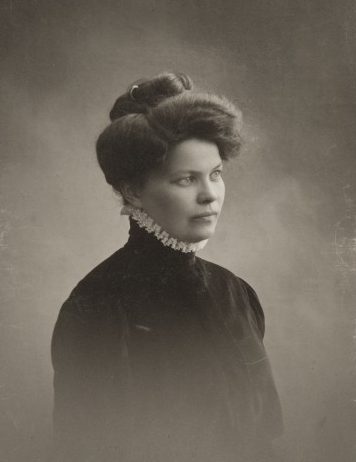Author: Irmeli Niemi
Dreams of freedom
Issue 4/1992 | Archives online, Authors
Maria Jotuni‘s first short stories appeared at the beginning of the century, as the successful campaign for women’s suffrage was being waged in Finland. Jotuni (1880–1943) was no suffragette, however, although both her short stories and her plays subject women’s lives, and, in particular, women’s grasp on their own lives, to constant examination.
In Jotuni’s work, women live under a triple burden: they seek their identities in relation to men, conventional mores and their own dreams. These relations are not linear, but often displaced, or inverted, as is demonstrated by the names of two of her plays: Miehen kylkiluu – ‘The rib of man’ – and Tohvelisankarin rouva – ‘The wife of a henpecked husband’. More…
Money, Morals and Love
Issue 1/1980 | Archives online, Authors

Maria Jotuni. Photo: Atelier Nyblin / CC-BY-4.0
Maria Jotuni‘s reputation as a writer rests on her daring and highly individual portrayals of women and on her gifts as a dramatist. Her works concentrate on analyses of the human condition, the contradictions, the frustrations, the fantasies. As the creative ‘observer’ she is both deeply sympathetic and ruthlessly revealing.
Maria Jotuni, whose centenary is celebrated this year, grew up in the eastern Finnish province of Savo and her early work draws richly on that background for subject matter and local colour. Her style, which over the years was honed and polished into a unique form of expression, certainly owes something to the lilting rhythms of the Savo dialect – and something to the lyricism of the Finnish Bible, with which she was familiar from her earliest years. Maria Haggrén, as she was born, was the second of six children; they lived in Kuopio, the home town of J. V. Snellman (1806–81), a man who did much to formulate the Finnish national identity, and of Minna Canth (1844–97), one of Finland’s major woman writers. The Haggréns were not wealthy, but they believed strongly in the pursuit of learning and knowledge. The home also provided a fruitful contact with rural life with opportunities to listen to the chatter and tales of the farm boys and servant girls. More…
-
About the author
Irmeli Niemi (1931–2008) was Professor of Literature in the University of Turku (1978–1990) and a director in the Ministry of Education and Culture in the early 1990s. Niemi was actively involved in developing government legislation on the financing system of theatres, museums and orchestras. Among her published works are books on theatre and literature, several of them on the novelist and playwright Maria Jotuni.
© Writers and translators. Anyone wishing to make use of material published on this website should apply to the Editors.
